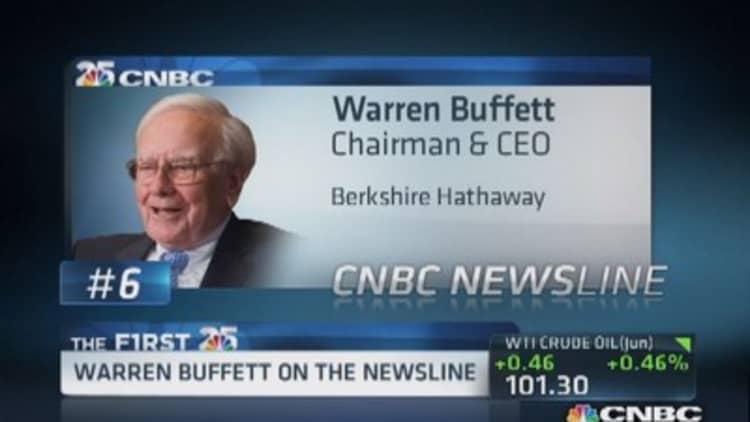CNBC Digital presents the first in a series of five articles on worst-case financial scenarios affecting clients in four age brackets: millennials and younger Gen Xers; people in their 40s and 50s; 60-somethings and pre-retirees; and those already in retirement. CNBC.com editor Eric Rosenbaum kicks off the series with an overview of worst-case scenarios and the missteps that lead to them. Look for further installments from members of the CNBC Digital Financial Advisors Council in coming weeks.
It takes money to make money, but it also takes money to lose it—sometimes a lot of it—and all too often at the wrong moments in life.
"Overconfidence is the precursor to the biggest mistakes made by investors of any age," said certified financial planner Tim Maurer, director of personal finance at the BAM Alliance.
Overconfidence, often couched in willful ignorance or hopeful naivety, can lead to overly aggressive, disastrous ends. Overestimation of intelligence is part of the problem, said Wayne von Borstel, certified financial planner and founder of von Borstel & Associates. More than half of Americans will tell you they are above average in intelligence, meaning the average American thinks he or she is smarter than the rest of the population, according to a recent study.
"People are always secretly nervous as hell but publicly optimistic," said Ed Butowsky, managing partner of Chapwood Investments. Moving back and forth between euphoria and dread makes some sense in describing the extremes to which investing can lead individuals: Americans suffer from low financial literacy and are also vulnerable to get-rich-quick schemes.
If it sounds too good to be true, it probably is, Maurer said.
For his part, Butowsky said greed is not even the biggest problem. It's individuals not taking the time to learn basic financial literacy or believing it is beyond them.
"Most people are scared to death and just trying to figure it out and don't know who to rely on," he said.

It doesn't have to be this way.
It's not too difficult or overly complex to construct a relatively inexpensive, diversified investment plan that will set you on the right savings and growth path.
Time is on your side: Ride out the ups and downs in the market, and rely on the power of compound interest.
The rise of low-cost products, like exchange-traded funds covering every asset class, means there are few investments out of the reach of any investor in creating a diversified plan.
The days of the fee-gouging wirehouse brokers pushing in-house product have been transformed by fee-only registered investment advisors, while the rise of online financial-planning software makes getting your accounts in order easier than ever before.
Read MoreThe millennial retirement problem
Still, investment worst-case scenarios are all too common across the major milestones in life:
—A 62-year-old who overspent and undersaved and has suddenly realized he'll never be able to make ends meet on Social Security and will have to work until he drops.
—A married couple who took out a second and third mortgage on their home (their second one) and has suddenly gone from affluent to fighting to even remain part of the middle class.
—Affluent investors who lost it all to the latest Bernie Madoff and now have to contemplate selling their home or not even being able to cover their children's college costs.
The scariest thing of all is that these investment worst-case scenarios have become all-too-typical scenarios today.
We're here to tell you: Don't give up! There is a way through the worst once it becomes reality. And there is a way to emerge on the investment straight and narrow.
We've canvassed the financial landscape for tales of woe from investors and financial advisors, but this isn't a campaign intended to scare you. In fact, we've put together a series of instructional articles from members of the CNBC Digital Financial Advisors Council on how to rescue your finances and recover from various worst-case scenarios.
And even if you're lucky enough to believe you are financially "all set" at the present time, cautionary tales can be instructive.
You never know: If you aren't careful or are overly confident, you could become the next nightmare example of the worst-case scenario investor.
Here are some simple rules to live—and financially plan—by to keep you on course.
1. Nothing that happens in the short run matters.
Butowsky said this applies to 401(k) investors, in particular, who tend to make the worst decisions because they have instant access to money. "Instant access to money is a major problem," Butwosky said. "It's being invested, not investment performance, that matters."

2. Don't confuse diversity of funds for proper diversification.
Andrew Holland, managing director of Quantitative Investment Advisors, said he has seen too many cases in which investors holding a number of funds think they are properly diversified when, in reality, they are holding a bunch of overlapping large-cap funds.
Holland, who works closely with many younger investors, said it's a huge risk for individuals or families with a three- to five-year time horizon, who are often saving up for a home down payment.
"Recently, some of my clients are getting more aggressive because we've had such gains in the S&P 500. If you want to save for three to five years, you need to be more cautious," Holland said.
"If you suffer a loss of 20 percent, it could take three, five, even seven years to make that back," he added.
Many individuals in this scenario end up liquidating a portfolio at a loss to pay off the liability—a home down payment, for example—that they expected their investment gains to cover.
Read MoreFinancially savvy widows can lead transformed life
3. Don't bet on one company's success—especially when it is your company.
Warren Buffett and Bill Gates did OK—OK, more than OK—sticking with the stock of one company. But for most self-employed entrepreneurs and company key executives, single-stock concentration is an investment worst-case scenario in the making.
For his part, von Borstel said he has seen too many entrepreneurs and executives let it ride on company stock after they had generated significant profits rather than harvest the stock gains to live on invested in a diversified portfolio.
"People get emotional and overconfident. If you have more than 10 percent of wealth in one company, I get nervous—25 percent [and] I get the hives," he said.
"You don't know what competition is going to do," von Borstel added. "Something that did well won't do well forever. Within 12 months, you might not exist."
4. Don't overspend.
Butowsky said the simplest rule to live by is having enough in liquid assets. "We always underestimate how much things cost and overestimate how much we will make on investments," he said. "Liquidity is the killer."
Reevaluating spending when accounts are being depleted and devising a disciplined financial plan can be the difference between digging out of a self-imposed hole or ending up in bankruptcy, and with all of the personal and professional shame that is attached to that, said certified financial planner Sheryl Garrett, CEO and chief compliance officer of Garrett Investment Advisors.
5. The closer you get to retirement, the more crucial the right decisions become.
Especially as individuals get older, they have to make conscious decisions about how much they will need and how much they can spend.
For those in their 50s and 60s, the decisions made in the years closing in on retirement can often determine the lifestyle they'll have in retirement. "I've watched many people succeed and fail at retirement over the years," said certified financial planner Barry Glassman, founder and president of Glassman Wealth Services.
"Too often, poor choices and poor planning have left many people unprepared for a retirement that can last 30 years or more."






